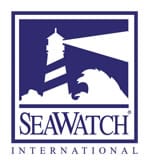All clam harvest vessels are running on low sulfur diesel fuel to lower emissions.
Green Initiative
Sea Watch International is reliant on the health of our global environment because our business begins with the wild harvest of two species of clams. If for no other reason we take our stewardship of the environment very seriously.
Through no small effort we have been able to reduce our overall energy usage and now operate our fleet of 30 company owned vessels with low sulfur fuel. Our four processing plants engage in numerous operational strategies, which reduce water usage and recycle water wherever possible. We recycle paper, cardboard, metals and even the clam shells are recycled and used for substrate to rebuild the ailing oyster reefs in the Chesapeake Bay.
As the largest processor of clams in the world we realize how small we are in the grand scheme of things but also how powerful our leadership can be in the fight for Global Health.
Carbon Disclosure Project
In 2008 Sea Watch International joined with companies like Heinz, Unilever, Nestle, Con Agra, General Mills, and Campbell Soup to become part of the solution instead of part of the problem. This project helps companies identify ways to reduce their carbon footprints while encouraging those up the supply chain to participate as well. This collaborative effort has the potential to change the way manufacturing is done in the later part of the 21st century. Sea Watch International is proud to take this stand for the environment.
Energy
Reduction of energy use is at the forefront of our “Green Initiative”. Implications cross many lines of conservation, pollution and cost savings. By investing in new technologies we have been able to dramatically reduce the amount of energy used to process a pound of meat.
Alternative Energy Sources
As part of our energy initiative, we are also investigating alternative sources of energy for our manufacturing facilities. We have recently been working with a firm to evaluate solar energy for our largest processing plant in Milford, DE.
Boiler Conversions
All Sea Watch boilers have been converted to natural gas to burn cleaner and cheaper.
Heat Exchangers
After a successful trial period at our New Bedford facility, we have installed the same heat exchanger at our Milford, DE facility. The heat exchangers use excess heat from the shuckers to preheat the water before it goes into the boilers. This reduces the amount of energy necessary to make steam for the plants.
Water Use
As in all food processing water is used in great abundance. Just like oil reserves, our aquifers are not an infinite source of clean water. By dramatically reducing the amount required to process a pound of meat we are conserving a vital resource while reducing effluent at the same time.
Water Recycling
Reusing water has been the most effective way to reduce water usage at our facilities. Some waters can be used to rinse down the shell area or docks.
Materials Recycling
All materials that are capable of being recycled are recycled. The use of non-recyclable materials is discouraged when ever possible. Oyster substrate restoration of DE and Chesapeake Bay’s. We have been involved with the states of DE, NJ and MD to provide clamshells to rebuild oyster grounds in the Delaware and Chesapeake Bays. This program not only helps to clean up the waters but also helps to revitalize two historic fisheries. Those shells that are not used for restoration are used for environmentally friendly roadways, driveways and landscaping projects.
Waste Disposal
Like many other aspects of our Green Initiatives, reducing our landfill deposits is both good for the environment as well as a cost reduction. One specific project at our New Bedford facility is sending appropriate waste to a compost facility instead of a landfill. There are some costs involved in doing this but they are less than a landfill and the compost can be reused as fertilizers.
Waste Water
Any water used in food processing must be treated and eventually winds up back in the water supply. In 2009 we spent over a million dollars on a new primary treatment system at out Milford, DE plant. This will pre-treat the water before it goes to the municipal facility and reduce onsite odors.
Waste/Byproduct Utilization
We are constantly searching for ways to find a use for as much by-product as we can. For instance some of the viscera material is currently being used as fertilizers. We have also entered into a joint venture to explore using clam viscera for fish feed to take advantage of its high nutrient content.
Low Sulphur Diesel Fuel Boats

